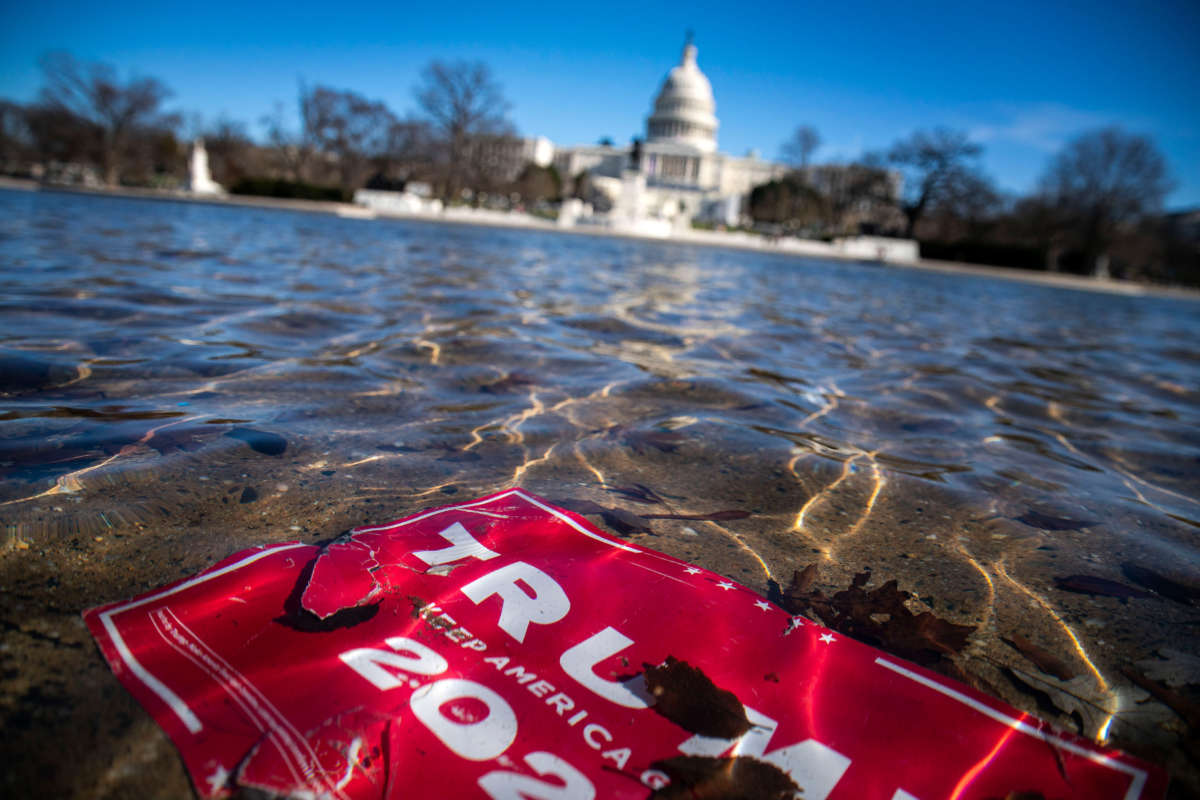Did you know that Truthout is a nonprofit and independently funded by readers like you? If you value what we do, please support our work with a donation.
A new poll released over the weekend demonstrates that a majority of U.S. voters are supportive of efforts to indict former President Donald Trump in his pending Senate impeachment trial this week — including, perhaps, at least a few million of those who cast a ballot for him last November.
An ABC News/Ipsos poll, conducted from February 5-6, found that 56 percent of Americans want Trump to be both convicted in the Senate trial and to be barred from holding federal office, including the presidency, ever again. (Trump has suggested that he might run for president again in 2024.)
The former president was impeached in the House last month for his role in instigating a mob of his supporters to attack the U.S. Capitol during the certification process of the Electoral College votes. His Senate trial is set to begin this week.
The numbers from that poll cannot be explained purely in partisan terms. As CNN’s Harry Enten pointed out in a recent analysis, “at no point last year in the polling between Trump and now-President Joe Biden did Biden ever earn anywhere close to 56% in the national average.”
“This means that there are likely millions of Americans who voted for Trump last year who now want him barred from holding federal office,” Enten added.
Indeed, Biden won the presidency with 51.3 percent of the vote to Trump’s 46.9 percent — a difference of 4.4 percent, which tallies almost exactly with the difference in the number of people who now want to see Trump convicted and barred from holding office for life versus those who don’t want him indicted, according to the poll.
The poll, and others like it, demonstrate a marked shift in how Americans felt almost one year ago, when the former president was impeached for the first time. On January 16, just prior to his first impeachment trial in 2020, Americans were mostly split on whether Trump should be convicted, with 47.1 percent opposed to the idea and 46.7 in favor of it, according to an averaging of polling data from RealClearPolitics.
Indicting Trump will be a difficult task for House impeachment managers. Even if every senator within the Democratic caucus votes to convict him, a successful indictment (which requires two-thirds of the Senate to vote in favor) would need to have 17 Republican senators voting with those Democrats in order for it to happen.
There’s plenty of evidence to suggest that Trump’s words and actions on January 6 led up to the breach of the Capitol and played a role in instigating the violence and attempted overthrow of democratic institutions which occurred on that day. Some of that evidence is apparent in court cases outside of Trump’s impeachment.
More than 185 Trump loyalists have been charged with federal crimes regarding the Capitol breach. In dozens of court documents for some of their pending trials, a clear pattern is evident: These individuals specifically cited Trump’s words for the reason why they descended upon Washington, D.C., in the first place.
The documents also show loyalists were further motivated by Trump’s months-long tirades erroneously claiming that the election had been stolen from him. Some even cited his comments — wrongly asserting that former Vice President Mike Pence had the power to stop the Electoral College certification — as the reason why they might have wanted to attack the Capitol.
“I’m there for the greatest celebration of all time after Pence leads the Senate flip!!” Pittsburgh Trump loyalist and QAnon supporter Kenneth Grayson wrote to an associate on December 23. “OR IM THERE IF TRUMP TELLS US TO STORM THE FUKIN CAPITAL IMA DO THAT THEN!”
Trump, who has called his words on that day “totally appropriate,” did indeed tell his supporters on January 6 to go to the Capitol, adding that they would “never take back our country with weakness.”
Trump’s defense team plans to employ a two-pronged approach to arguing against his indictment, suggesting that the proceedings themselves are unconstitutional since he’s no longer a sitting president, and that his First Amendment speech rights afford him protection from bearing any responsibility for what happened.
Legal experts have denounced both ideas. In an open letter from 150 legal scholars with differing political points of view, constitutional scholars and legal experts said that, “despite our differences, our carefully considered views of the law lead all of us to agree that the Constitution permits the impeachment, conviction, and disqualification of former officers, including presidents.”
Trump’s “free speech” argument has similarly been dissected and found to be problematic. NPR legal affairs correspondent Nina Totenberg, speaking during a segment on the station last week regarding the issue, noted that “there is nothing in the Constitution that says you can’t hold public officials accountable for incendiary or inciting speech.”
Media that fights fascism
Truthout is funded almost entirely by readers — that’s why we can speak truth to power and cut against the mainstream narrative. But independent journalists at Truthout face mounting political repression under Trump.
We rely on your support to survive McCarthyist censorship. Please make a tax-deductible one-time or monthly donation.
